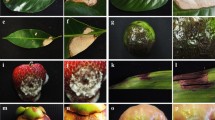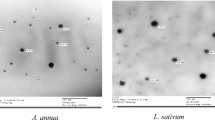Abstract
RED-RING disease of coconuts is caused by the nematode Rhadinaphelenchus cocophilus (Cobb 1919) Goodey 1960, which colonizes the stem in a ring 3–5 cm inside the periphery where the fibro-vascular strands are densest, and causes the formation of a distinctive red-orange band in this zone. Characteristic symptoms are yellowing and wilting of leaves.
This is a preview of subscription content, access via your institution
Access options
Subscribe to this journal
Receive 51 print issues and online access
$199.00 per year
only $3.90 per issue
Buy this article
- Purchase on Springer Link
- Instant access to full article PDF
Prices may be subject to local taxes which are calculated during checkout
Similar content being viewed by others
References
Fenwick, D. W., and Maharaj, S., Nature, 185, 259 (1960).
Bain, F. M., Bronze Leaf Wilt Disease of the Coconut Palm (Govt. Printing Office, Trinidad, 1937).
Goberdhan, L. C., Ann. Rep., 1961, Trinidad and Tobago Coconut Research, Ltd. (1961).
Kalyansundaram, R., J. Indian Bot., 33, 329 (1954).
Struckmeyer, B. E., Beckman, C. H., Kunts, J. E., and Riker, A. J., Phytopath., 44, 148 (1954).
Talboys, P. W., Trans. Brit. Mycol. Soc., 40, 415 (1957).
Author information
Authors and Affiliations
Rights and permissions
About this article
Cite this article
GOBERDHAN, L. Possible Presence of a Phytotoxin in Red-ring Infected Trees. Nature 197, 619–620 (1963). https://doi.org/10.1038/197619b0
Issue Date:
DOI: https://doi.org/10.1038/197619b0
Comments
By submitting a comment you agree to abide by our Terms and Community Guidelines. If you find something abusive or that does not comply with our terms or guidelines please flag it as inappropriate.



